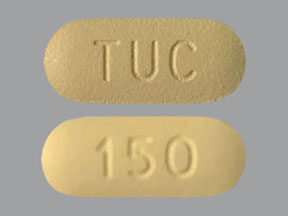Tukysa Dosage
Generic name: Tucatinib 50mg
Dosage form: tablet
Drug class: HER2 inhibitors
Medically reviewed by Drugs.com. Last updated on Nov 4, 2024.
2.1 Patient Selection
Select patients for treatment of unresectable or metastatic colorectal cancer with TUKYSA based on the presence of:
- •
- HER2 overexpression or gene amplification. FDA-approved tests for the detection of HER2 overexpression and gene amplification in patients with unresectable or metastatic colorectal cancer are not currently available, and
- •
- RAS wild-type.
Unresectable or Metastatic Colorectal Cancer
The recommended dosage of TUKYSA is 300 mg taken orally twice daily in combination with trastuzumab until disease progression or unacceptable toxicity.
Advise patients to swallow TUKYSA tablets whole and not to chew, crush, or split prior to swallowing. Advise patients not to ingest tablet if it is broken, cracked, or not otherwise intact.
Advise patients to take TUKYSA approximately 12 hours apart and at the same time each day with or without a meal.
If the patient vomits or misses a dose of TUKYSA, instruct the patient to take the next dose at its usual scheduled time.
When given in combination with TUKYSA, the recommended dosage of capecitabine is 1000 mg/m2 orally twice daily taken within 30 minutes after a meal. TUKYSA and capecitabine can be taken at the same time. Refer to the Full Prescribing Information for trastuzumab and capecitabine for additional information.
Dosage Modifications for Adverse Reactions
The recommended TUKYSA dose reductions and dosage modifications for adverse reactions are provided in Tables 1 and 2. Refer to the Full Prescribing Information for trastuzumab and capecitabine for information about dosage modifications for these drugs.
|
Dose Reduction |
Recommended TUKYSA Dosage |
|
First |
250 mg orally twice daily |
|
Second |
200 mg orally twice daily |
|
Third |
150 mg orally twice daily |
Permanently discontinue TUKYSA in patients unable to tolerate 150 mg orally twice daily.
|
Adverse Reaction* |
Severity |
TUKYSA Dosage Modification |
|
Diarrhea |
Grade 3 without anti-diarrheal treatment |
Initiate or intensify appropriate medical therapy. Hold TUKYSA until recovery to ≤ Grade 1, then resume TUKYSA at the same dose level. |
|
Grade 3 with anti-diarrheal treatment |
Initiate or intensify appropriate medical therapy. Hold TUKYSA until recovery to ≤ Grade 1, then resume TUKYSA at the next lower dose level. |
|
|
Grade 4 |
Permanently discontinue TUKYSA. |
|
|
Hepatotoxicity† |
Grade 2 bilirubin (>1.5 to 3 × ULN) |
Hold TUKYSA until recovery to ≤ Grade 1, then resume TUKYSA at the same dose level. |
|
Grade 3 ALT or AST (> 5 to 20 × ULN) |
Hold TUKYSA until recovery to ≤ Grade 1, then resume TUKYSA at the next lower dose level. |
|
|
Grade 4 ALT or AST (> 20 × ULN) |
Permanently discontinue TUKYSA. |
|
|
ALT or AST > 3 × ULN |
Permanently discontinue TUKYSA. |
|
|
Other adverse reactions |
Grade 3 |
Hold TUKYSA until recovery to ≤ Grade 1, then resume TUKYSA at the next lower dose level. |
|
Grade 4 |
Permanently discontinue TUKYSA. |
|
Dosage Modifications for Severe Hepatic Impairment
For patients with severe hepatic impairment (Child-Pugh C), reduce the recommended dosage to 200 mg orally twice daily.
Dosage Modifications for Concomitant Use with Strong CYP2C8 Inhibitors
Avoid concomitant use of strong CYP2C8 inhibitors with TUKYSA. If concomitant use with a strong CYP2C8 inhibitor cannot be avoided, reduce the recommended dosage to 100 mg orally twice daily. After discontinuation of the strong CYP2C8 inhibitor for 3 elimination half-lives, resume the TUKYSA dose that was taken prior to initiating the inhibitor.
Frequently asked questions
- How effective is tucatinib (Tukysa) for breast cancer?
- What’s the difference between tucatinib and neratinib?
- What's the mechanism of action for tucatinib?
More about Tukysa (tucatinib)
- Check interactions
- Compare alternatives
- Pricing & coupons
- Drug images
- Side effects
- During pregnancy
- FDA approval history
- Drug class: HER2 inhibitors
- Breastfeeding
- En español
Patient resources
Professional resources
Related treatment guides
See also:
Further information
Always consult your healthcare provider to ensure the information displayed on this page applies to your personal circumstances.


